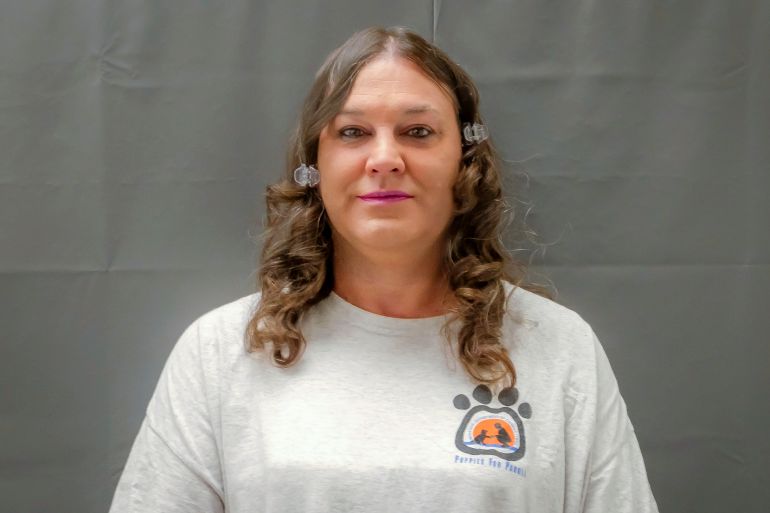Missouri carries out first US execution of a transgender person
Amber McLaughlin, convicted of murder, was executed by lethal injection after being denied clemency.

A Missouri inmate was put to death on Tuesday for a 2003 killing in what is believed to be the first execution of a transgender person in the United States.
Amber McLaughlin, 49, was convicted of stalking and killing a former girlfriend, then dumping the body near the Mississippi River in St Louis.
Keep reading
list of 3 itemsBranson declines Singapore’s invite to death penalty debate
Japan’s justice minister resigns over death penalty comments
McLaughlin’s fate was sealed earlier on Tuesday when Republican Governor Mike Parson declined a clemency request.
McLaughlin spoke with a spiritual adviser at her side as the fatal dose of pentobarbital was injected. She was pronounced dead a few minutes later,
In a final written statement, McLaughlin regretted her actions. “I am sorry for what I did,” she said. “I am a loving and caring person.”
A database on the website for the anti-execution Death Penalty Information Center shows that 1,558 people have been executed since the death penalty was reinstated in the mid-1970s. All but 17 of those put to death were men.
The centre said there are no known previous cases of an openly transgender inmate being executed.
McLaughlin began transitioning about three years ago at the state prison in Potosi.
The clemency petition cited McLaughlin’s traumatic childhood and mental health issues, which the jury never heard during her trial.
A foster parent rubbed faeces in her face when she was a toddler and her adoptive father used a stun gun on her, according to the petition. It cited severe depression that resulted in multiple suicide attempts, both as a child and as an adult.
The petition also included reports citing a diagnosis of gender dysphoria, a condition that causes anguish and other symptoms as a result of a disparity between a person’s gender identity and their assigned sex at birth.
But McLaughlin’s sexual identity was “not the main focus” of the clemency request, her lawyer, Larry Komp, said.
In 2003, long before transitioning, McLaughlin was in a relationship with Beverly Guenther. After they stopped dating, McLaughlin would show up at the suburban St Louis office where the 45-year-old Guenther worked, sometimes hiding inside the building, according to court records.
Guenther obtained a restraining order and police officers occasionally escorted her to her car after work.
Guenther’s neighbours called police the night of November 20, 2003, when she failed to return home. Officers went to the office building, where they found a broken knife handle near her car and a trail of blood.
A day later, McLaughlin led police to a location near the Mississippi River in St Louis, where the body had been dumped. Authorities said she had been raped and stabbed repeatedly with a steak knife.
McLaughlin was convicted of first-degree murder in 2006. A judge sentenced McLaughlin to death after a jury was deadlocked on the sentence. Komp said Missouri and Indiana are the only states that allow a judge to sentence someone to death.
A court in 2016 ordered a new sentencing hearing, but a federal appeals court panel reinstated the death penalty in 2021.
“McLaughlin terrorised Ms Guenther in the final years of her life, but we hope her family and loved ones may finally have some peace,” Parson said in a written statement after the execution.